英语语法—名词和名词词组
- 格式:ppt
- 大小:263.50 KB
- 文档页数:38
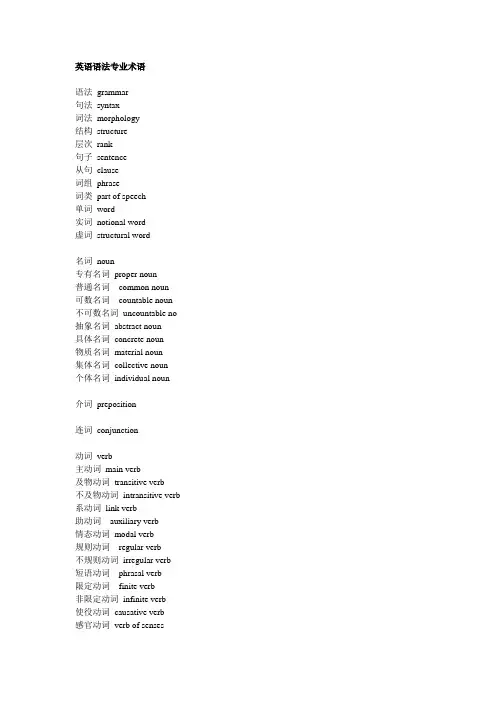
英语语法专业术语语法grammar句法syntax词法morphology结构structure层次rank句子sentence从句clause词组phrase词类part of speech单词word实词notional word虚词structural word名词noun专有名词proper noun普通名词common noun可数名词countable noun 不可数名词uncountable no 抽象名词abstract noun具体名词concrete noun物质名词material noun集体名词collective noun个体名词individual noun介词preposition连词conjunction动词verb主动词main verb及物动词transitive verb不及物动词intransitive verb 系动词link verb助动词auxiliary verb情态动词modal verb规则动词regular verb不规则动词irregular verb 短语动词phrasal verb限定动词finite verb非限定动词infinite verb使役动词causative verb感官动词verb of senses动态动词event verb静态动词state verb感叹词exclamation形容词adjective副词adverb方式副词adverb of manner程度副词adverb of degree时间副词adverb of time地点副词adverb of place修饰性副词adjunct连接性副词conjunct疑问副词interrogative adverb关系副词relative adverb代词pronoun人称代词personal pronoun物主代词possessive pronoun反身代词reflexive pronoun相互代词reciprocal pronoun指示代词demonstrative pronoun疑问代词interrogative pronoun关系代词relative pronoun不定代词indefinite物主代词possessive pronoun名词性物主代词nominal possessive形容词性物主代词adjectival possessive pronoun冠词article定冠词definite article不定冠词indefinite article数词numeral基数词cardinal numeral序数词ordinal numeral分数词fractional numeral形式form单数形式singular form复数形式plural form限定动词finite verb form非限定动词non-finite verb form原形base form从句clause从属句subordinate clause并列句coordinate clause名词从句nominal clause定语从句attributive clause状语从句adverbial clause宾语从句object clause主语从句subject clause同位语从句appositive clause时间状语从句adverbial clause of time地点状语从句adverbial clause of place方式状语从句adverbial clause of manner让步状语从句adverbial clause of concession原因状语从句adverbial clause of cause结果状语从句adverbial clause of result目的状语从句adverbial clause of purpose条件状语从句adverbial clause of condition真实条件状语从句adverbial clause of real condition非真实条件状语从句adverbial clause of unreal condition 含蓄条件句adverbial clause of implied condition错综条件句adverbial clause of mixed condition句子sentence简单句simple sentence并列句compound sentence复合句complex sentence并列复合句compound complex sentence陈述句declarative sentence疑问句interrogative sentence一般疑问句general question特殊疑问句special question选择疑问句alternative question附加疑问句tag question反义疑问句disjunctive question修辞疑问句rhetorical question感叹疑问句exclamatory question存在句existential sentence肯定句positive sentence否定句negative sentence祈使句imperative sentence省略句elliptical sentence感叹句exclamatory sentence基本句型basic sentence pattern句子成分members of sentences 主语subject谓语predicate宾语object双宾语dual object直接宾语direct object间接宾语indirect object复合宾语complex object同源宾语cognate object补语complement主补subject complement宾补object complement表语predicative定语attribute同位语appositive状语adverbial句法关系syntactic relationship 并列coordinate从属subordination修饰modification前置修饰pre-modification后置修饰post-modification限制restriction双重限制double-restriction非限制non-restriction数number单数形式singular form复数形式plural form规则形式regular form不规则形式irregular form格case普通格common case所有格possessive case主格nominative case宾格objective case性gender阳性masculine阴性feminine通性common中性neuter人称person第一人称first person第二人称second person第三人称third person时态tense过去将来时past future tense过去将来进行时past future continuous tense过去将来完成时past future perfect tense一般现在时present simple tense一般过去时past simple tense一般将来时future simple tense现在完成时past perfect tense过去完成时present perfect tense将来完成时future perfect tense现在进行时present continuous tense过去进行时past continuous tense将来进行时future continuous tense过去将来进行时past future continuous tense现在完成进行时present perfect continuous tense 过去完成进行时past perfect continuous tense语态voice主动语态active voice被动语态passive voice语气mood陈述语气indicative mood祈使语气imperative mood虚拟语气subjunctive mood否定negation否定范围scope of negation全部否定full negation局部否定partial negation转移否定shift of negation语序order自然语序natural order倒装语序inversion全部倒装full inversion部分倒装partial inversion直接引语direct speech间接引语indirect speech自由直接引语free direct speech自由间接引语free indirect speech一致agreement主谓一致subject-predicate agreement 语法一致grammatical agreement概念一致notional agreement就近原则principle of proximity强调emphasis重复repetition语音pronunciation语调tone升调rising tone降调falling tone降升调falling-rising tone文体style正式文体formal非正式文体informal口语spoken/oral English套语formulistic expression英国英语British English美国英语American English用法usage感情色彩emotional coloring褒义commendatory贬义derogatory幽默humorous讽刺sarcastic挖苦ironic动名词gerund连字号hyphen祈使语气imperative mood祈使句imperative sentences独立成分indefinite case主句indicative mood物质名词material nouns句子的成分members of the sentence 情态动词modal verbs语气mood词法morphology否定疑问句negative interrogative sentence动词的非限定形式non-finite forms of the verb非限制性定语从句non-restrictive attributive clauses 括号brackets名词的分类classification of nouns从句(分句)clauses同源宾语cognate object集体名词collective nouns冒号colon逗号comma普通格common case普通名词common nouns比较级comparative degree复合宾语complex Object复合句complex sentences并列复合句compound complex sentences表性状的复合谓语compound nominal predicate复合谓语compound predicate并列句compound sentences表行为的复合谓语compound verbal predicate合成词compound words合成compounding ( composition )错综时间条件句conditional sentences of mixed time 连词conjunction连接副词conjunctive adverbs连接代词conjunctive pronouns转化conversion并列连词co-coordinating conjunctions可数名词countable nouns破折号dash陈述句declarative sentences定冠词definite article比较的级别degrees of comparison指示代词demonstrative pronouns派生(词缀法)derivation ( affixation )描绘性定语descriptive attributes呼语direct address直接宾语direct object直接引语direct speech反意问句disjunctive questions省略ellipsis省略句elliptical sentences感叹号exclamation mark感叹句exclamatory sentences动词的限定形式finite forms of the verb虚词form words分数词fractional numerals完全倒装full inversion将来进行时future continuous一般将来时future indefinite将来完成时future perfect将来完成进行时future perfect continuous独立结构absolute constructions物主代词的绝对形式absolute forms of possessive pronouns 抽象名词abstract nouns主动语态active voice方式状语从句adverbial clauses of manner地点状语从句adverbial clauses of place目的状语从句adverbial clauses of purpose时间状语从句adverbial clauses of time程度副词adverbs of degree频度副词adverbs of frequency方式副词adverbs of manner地点副词adverbs of place时间副词adverbs of time选择问句alternative questions句子分析analysis of sentences省略号apostrophe同谓语appositive同位语从句appositive clauses助动词auxiliary verbs插入语parenthesis部分倒装partial inversion分词短语participial phrases分词participle小品词particle词类parts of speech过去式past forms过去分词past participle句号period ( full stop )人称person人称代词personal pronouns成语动词phrasal verbs谓语predicate表语predicative表语从句predicative clauses前缀prefix(es)介词短语prepositional phrases现在式present forms现在分词present participle动词的主要形式principal forms of verbs专有名词proper nouns标点符号punctuation问号question mark引号quotation mark相互代词reciprocal pronouns不定代词indefinite Pronouns关系副词relative adverbs关系代词relative pronouns限制性定语从句restrictive attributive clauses 自身代词self pronouns分号semicolon真实条件句sentences of real condition虚拟条件句sentences of unreal condition时态的呼应sequence of tenses特殊问句special questions虚拟语气subjunctive mood后缀suffix(es)最高级superlative degree句法syntax句型的转换transformation of sentences双部句two-member sentences不可数名词uncountable nouns动词短语verbal phrases名词化的动词verbal noun构词法word building。

名词和名词短语(2) 限定词和属格4.1 限定词 Determiner在名词词组中对名词中心词起特指,类指以及表示数量等限定的词。
Determiners refer to the words which are used in the pre-modification of a noun phrase which typically precede any adj. that pre-modify the head word. 限定词和形容词区别 Difference between Determiner and Adjective1.前置限定, 限定词在形容词前面.Determiner usually precede adj. in pre-modification.2.限定词的选择受中心词影响而形容词不受。
The choice of Determiner is determined by the head word but not that of adj.3.形容词表明中心词的特征,而限定词限定中心词的意义数量。
Adj. describe the head word by showing its characteristic while determiner determine the head word by identifying or quantifying.4.形容词可位于中心词后,而限定词不可。
Adj. can post-modify the head word but not Determiner.5.形容词有比较级而限定词没有(除few, little, many much 外) 。
Adj. has comparative form but not Determiner (except few, little, many much ). 4.1.2 Co-occurrence of DeterminersDeterminer may co-occurrence in the pre-modification of a noun phrase: two or more determiner may modify one and the same head word. Each determiner takes a fixed position , we identify their relative positions in the case of co-occurrence. 定义考点1定义前位限定Pre-Determiner 中位限定Central Determiner 后位限定Post DeterminerAll, BothHalf, Double Twice, Three times …One-third, Two-thirds…WhatSuchmany A, TheThis, That, These, ThoseMy, your, his…John’s…(Genitive)Any, Some, NoEach, Every, Either, Neither,WhatWhich(ever), Whose(ever)One, Two, Three…First, Second, Third….Next, Last,Few, Many, MuchAnother, Other,SeveralSuchPre-determiners and Central Determiners are mutually exclusive, that is in one and the same Noun Phrase, there could be only one Pre-determiner and Central Determiner, however, Post-Determiners are not mutually exclusive.4.1.3 Usage of some DeterminersAll and Whole (difference)1.All强调个体中的每一个,某种程度上与every相似。


名词和名词词组:限定词和属格一、学习要点(一)限定词限定词是在名词词组中对名词中心词起特指、类指以及表示数量等限定作用的词类。
限定词与形容词的差别在于:(1)当限定词与形容词同时出现在一个名词词组里时,通常的顺序是:限定词在前,形容词在后;(2)限定词的选择受名词中心词的类别的严格限制,而形容词的选择虽也受词汇意义的限制,但没有语法意义上的限制;(3)限定词对名词中心词只在所指意义上起限定作用,而形容词作为前置修饰语则起描写作用;(4)限定词通常只能前置,而形容词作名词修饰语时既可前置又可后置;(5)除few,little,many,much外,限定词一般没有比较级和最高级形式,而形容词通常有之。
1.限定词的搭配按照限定词与限定词的相互搭配关系,限定词可分为前位限定词(predeterminer)、中位限定词(central determiner)和后位限定词(postdeterminer),它们的顺序为:前位+中位+后位。
这三类限定词中,前位限定词与前位限定词以及中位限定词与中位限定词是相互排斥的,后位限定词与后位限定词之间虽不相互排斥但有搭配限制。
2.一些限定词的用法A. all and wholeall可修饰所有的名词,包括单数可数名词、复数可数名词、不可数名词和专有名词。
如:I didn't see all the film.Turn in all your papers before Friday.They lost all hope of finding the survivors.all与whole意思相近,但语法上有差别,如:They stayed here all day(=…the whole day).All the town were celebrating the victory that night(=The whole town…).在修饰复数名词时,all强调“所有”,包括所有成员,意思与every相近。
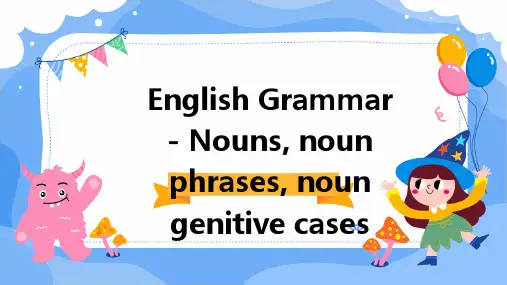
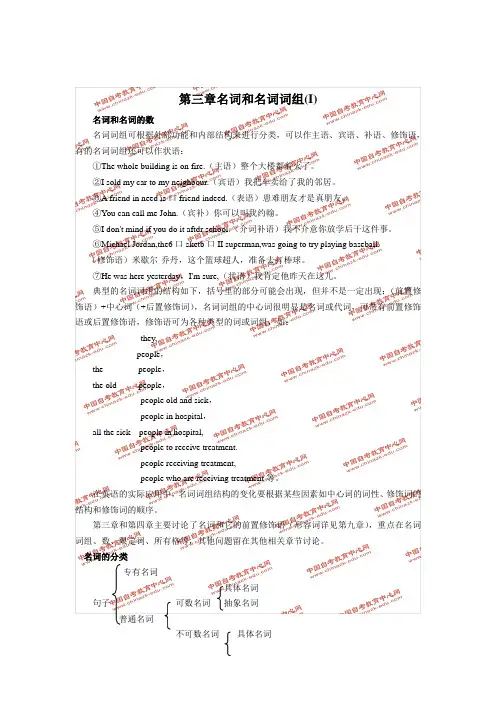
第三章名词和名词词组(I)名词和名词的数名词词组可根据外部功能和内部结构来进行分类,可以作主语、宾语、补语、修饰语,有的名词词组还可以作状语:①The whole building is on fire.(主语)整个大楼都着火了。
②I sold my car to my neighbour.(宾语)我把车卖给了我的邻居。
③A friend in need is口friend indeed.(表语)患难朋友才是真朋友。
④You can call me John.(宾补)你可以叫我约翰。
⑤I don't mind if you do it aftdr school.(介词补语)我不介意你放学后干这件事。
⑥Michael Jordan,the6口sketb口II superman,was going to try playing baseball.(修饰语)米歇尔·乔丹,这个篮球超人,准备去打棒球。
⑦He was here yesterday,I'm sure,(状语)我肯定他昨天在这儿。
典型的名词词组的结构如下,括号里的部分可能会出现,但并不是一定出现:(前置修饰语)+中心词(+后置修饰词),名词词组的中心词很明显是名词或代词,可带有前置修饰语或后置修饰语,修饰语可为各种类型的词或词组,如:they,people,the people,the old people,people old and sick,people in hospital,all the sick people in hospital,people to receive treatment.people receiving treatment,people who are receiving treatment等。
在英语的实际应用中,名词词组结构的变化要根据某些因素如中心词的词性、修饰词的结构和修饰词的顺序。
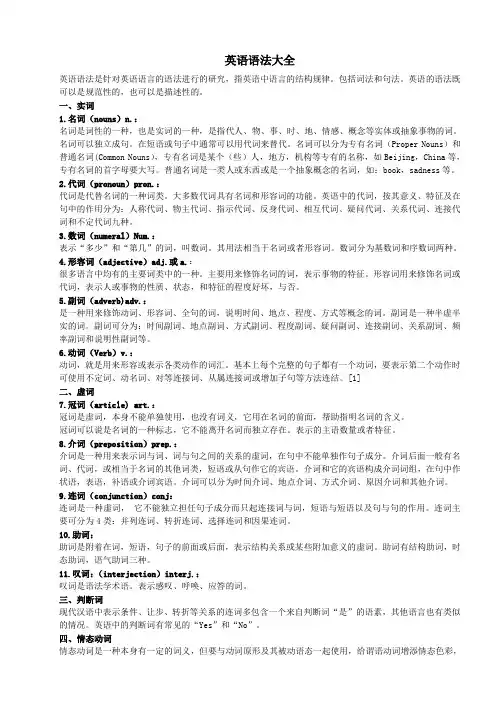
英语语法大全英语语法是针对英语语言的语法进行的研究,指英语中语言的结构规律。
包括词法和句法。
英语的语法既可以是规范性的,也可以是描述性的。
一、实词1.名词(nouns)n.:名词是词性的一种,也是实词的一种,是指代人、物、事、时、地、情感、概念等实体或抽象事物的词。
名词可以独立成句。
在短语或句子中通常可以用代词来替代。
名词可以分为专有名词(Proper Nouns)和普通名词(Common Nouns),专有名词是某个(些)人,地方,机构等专有的名称,如Beijing,China等,专有名词的首字母要大写。
普通名词是一类人或东西或是一个抽象概念的名词,如:book,sadness等。
2.代词(pronoun)pron.:代词是代替名词的一种词类。
大多数代词具有名词和形容词的功能。
英语中的代词,按其意义、特征及在句中的作用分为:人称代词、物主代词、指示代词、反身代词、相互代词、疑问代词、关系代词、连接代词和不定代词九种。
3.数词(numeral)Num.:表示“多少”和“第几”的词,叫数词。
其用法相当于名词或者形容词。
数词分为基数词和序数词两种。
4.形容词(adjective)adj.或a.:很多语言中均有的主要词类中的一种。
主要用来修饰名词的词,表示事物的特征。
形容词用来修饰名词或代词,表示人或事物的性质、状态,和特征的程度好坏,与否。
5.副词(adverb)adv.:是一种用来修饰动词、形容词、全句的词,说明时间、地点、程度、方式等概念的词。
副词是一种半虚半实的词。
副词可分为:时间副词、地点副词、方式副词、程度副词、疑问副词、连接副词、关系副词、频率副词和说明性副词等。
6.动词(Verb)v.:动词,就是用来形容或表示各类动作的词汇。
基本上每个完整的句子都有一个动词,要表示第二个动作时可使用不定词、动名词、对等连接词、从属连接词或增加子句等方法连结。
[1]二、虚词7.冠词(article) art.:冠词是虚词,本身不能单独使用,也没有词义,它用在名词的前面,帮助指明名词的含义。

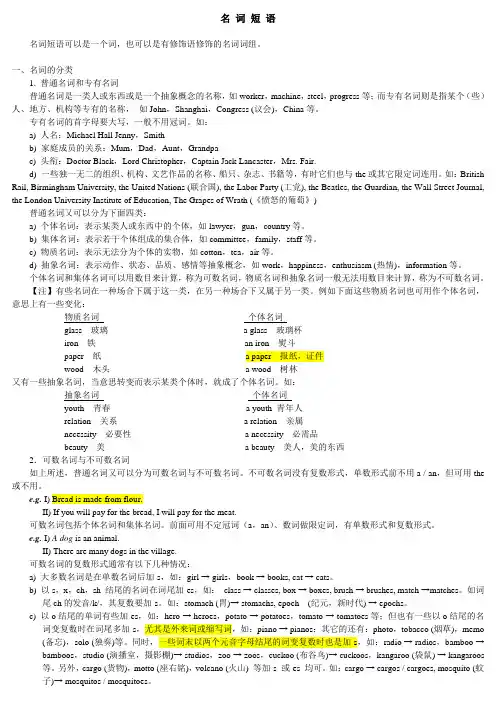
名词短语名词短语可以是一个词,也可以是有修饰语修饰的名词词组。
一、名词的分类1. 普通名词和专有名词普通名词是一类人或东西或是一个抽象概念的名称,如worker,machine,steel,progress等;而专有名词则是指某个(些)人、地方、机构等专有的名称,如John,Shanghai,Congress (议会),China等。
专有名词的首字母要大写,一般不用冠词。
如:a) 人名:Michael Hall Jenny,Smithb) 家庭成员的关系:Mum,Dad,Aunt,Grandpac) 头衔:Doctor Black,Lord Christopher,Captain Jack Lancaster,Mrs. Fair.d) 一些独一无二的组织、机构、文艺作品的名称、船只、杂志、书籍等,有时它们也与the或其它限定词连用。
如:British Rail, Birmingham University, the United Nations (联合国), the Labor Party (工党), the Beatles, the Guardian, the Wall Street Journal, the London University Institute of Education, The Grapes of Wrath (《愤怒的葡萄》)普通名词又可以分为下面四类:a) 个体名词:表示某类人或东西中的个体,如lawyer,gun,country等。
b) 集体名词:表示若干个体组成的集合体,如committee,family,staff等。
c) 物质名词:表示无法分为个体的实物,如cotton,tea,air等。
d) 抽象名词:表示动作、状态、品质、感情等抽象概念,如work,happiness,enthusiasm (热情),information等。
个体名词和集体名词可以用数目来计算,称为可数名词,物质名词和抽象名词一般无法用数目来计算,称为不可数名词。
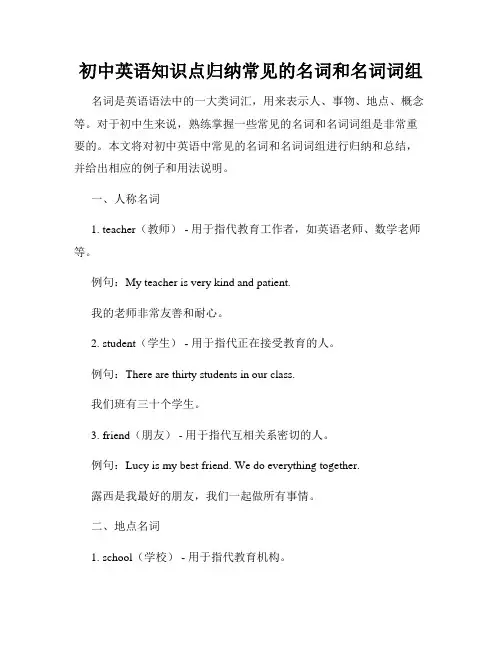
初中英语知识点归纳常见的名词和名词词组名词是英语语法中的一大类词汇,用来表示人、事物、地点、概念等。
对于初中生来说,熟练掌握一些常见的名词和名词词组是非常重要的。
本文将对初中英语中常见的名词和名词词组进行归纳和总结,并给出相应的例子和用法说明。
一、人称名词1. teacher(教师) - 用于指代教育工作者,如英语老师、数学老师等。
例句:My teacher is very kind and patient.我的老师非常友善和耐心。
2. student(学生) - 用于指代正在接受教育的人。
例句:There are thirty students in our class.我们班有三十个学生。
3. friend(朋友) - 用于指代互相关系密切的人。
例句:Lucy is my best friend. We do everything together.露西是我最好的朋友,我们一起做所有事情。
二、地点名词1. school(学校) - 用于指代教育机构。
例句:I go to school from Monday to Friday.我从周一到周五上学。
2. park(公园) - 用于指代供人们休闲、娱乐的场所。
例句:I like to play basketball in the park with my friends.我喜欢和朋友们在公园里打篮球。
三、物体名词1. book(书籍) - 用于指代用纸张制作的阅读材料。
例句:I borrowed a book from the library yesterday.昨天我从图书馆借了一本书。
2. pen(钢笔) - 用于指代用于写字的工具。
例句:Can I borrow your pen? I forgot mine at home.我可以借用你的钢笔吗?我把我的忘在家里了。
四、抽象名词1. love(爱) - 用于表示深情和关心。
例句:I love my family very much.我非常爱我的家人。
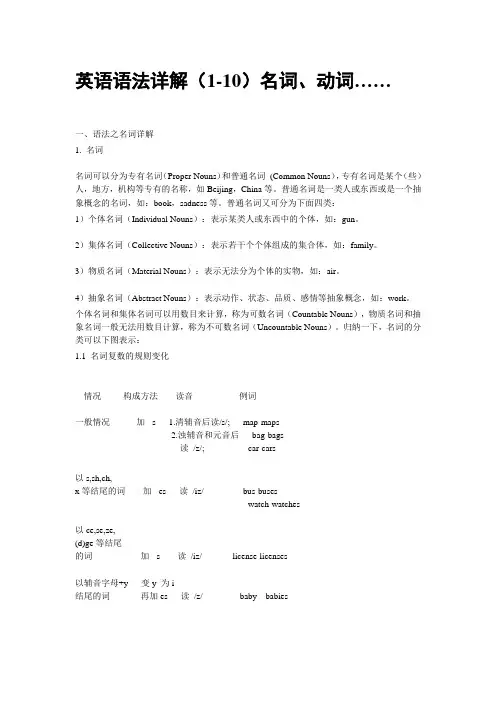
英语语法详解(1-10)名词、动词……一、语法之名词详解1. 名词名词可以分为专有名词(Proper Nouns)和普通名词(Common Nouns),专有名词是某个(些)人,地方,机构等专有的名称,如Beijing,China等。
普通名词是一类人或东西或是一个抽象概念的名词,如:book,sadness等。
普通名词又可分为下面四类:1)个体名词(Individual Nouns):表示某类人或东西中的个体,如:gun。
2)集体名词(Collective Nouns):表示若干个个体组成的集合体,如:family。
3)物质名词(Material Nouns):表示无法分为个体的实物,如:air。
4)抽象名词(Abstract Nouns):表示动作、状态、品质、感情等抽象概念,如:work。
个体名词和集体名词可以用数目来计算,称为可数名词(Countable Nouns),物质名词和抽象名词一般无法用数目计算,称为不可数名词(Uncountable Nouns)。
归纳一下,名词的分类可以下图表示:1.1 名词复数的规则变化___________________________________________________情况构成方法读音例词__________________________________________________一般情况加-s 1.清辅音后读/s/;map-maps2.浊辅音和元音后bag-bags读/z/;car-cars___________________________________________________以s,sh,ch,x等结尾的词加-es读/iz/ bus-buseswatch-watches_______________________________________________________以ce,se,ze,(d)ge等结尾的词加-s读/iz/ license-licenses_________________________________________________________以辅音字母+y变y 为i结尾的词再加es读/z/ baby---babies_________________________________________________________1.2 其它名词复数的规则变化1) 以y结尾的专有名词,或元音字母+y 结尾的名词变复数时,直接加s变复数:如:two Marys the Henrysmonkey---monkeys holiday---holidays比较:层楼:storey ---storeys story---stories2) 以o 结尾的名词,变复数时:a. 加s,如:photo---photos piano---pianosradio---radios zoo---zoos;b. 加es,如:potato--potatoes tomato--tomatoesc. 均可,如:zero---zeros / zeroes3) 以f或fe 结尾的名词变复数时:a. 加s,如:belief---beliefs roof---roofssafe---safes gulf---gulfs;b. 去f,fe 加ves,如:half---halvesknife---knives leaf---leaves wolf---wolveswife---wives life---lives thief---thieves;c. 均可,如:handkerchief:handkerchiefs / handkerchieves1.4 不可数名词量的表示1)物质名词a. 当物质名词转化为个体名词时。
2021届中考英语语法真题训练:名词及名词短语【含答案】一.名词名词的种类:专有名词普通名词国名地名人名,团体机构名称可数名词不可数名词个体名词集体名词抽象名词物质名词II. 名词的数:1. 规则名词的复数形式:名词的复数形式,一般在单数形式后面加-s或-es。
现将构成方法与读音规则列表如下:规则例词1一般情况在词尾加-s map-maps, sea-seas, girl-girls, day-days2以s, x, ch, sh结尾的名词后加-es class-classes, box-boxes, watch-watches, dish-dishes3以-f或-fe结尾的词变-f和-fe为v再加-esleaf-leaves, thief-thieves, knife-knives,wife-wives, half-halves加-s chief-chiefs, proof-proofs, roof-roofs4以辅音字母加y结尾的名词,变y为i加-esparty-parties, family-families, story-stories,city-cities5以元音字母加y结尾的名词,或专有名词以y结尾的,加-stoy-toys, boy-boys, day-days, ray-rays,Henry-Henrys6以辅音字母加一般加-esNegro-Negroes, hero-heroes, potato-potatoes,tomato-tomatoes-o结尾的名词不少外来词加-spiano-pianos, photo-photos, auto-autos,kilo-kilos, solo-solos两者皆可zero-zeros/zeroes, volcano-volcanoes/ volcanos7以元音字母加-o结尾的名词加-s radio-radios, bamboo-bamboos, zoo-zoos8以-th结尾的名词加-s truth-truths, mouth-mouths, month-months, path-paths,2. 不规则名词复数:英语里有些名词的复数形式是不规则的,现归纳如下:规则例词1改变名词中的元音字母或其他形式man-men, woman-women, foot-feet, goose-geese, mouse-mice2单复数相同sheep, deer, means, works, fish, yuan, jin, 3只有复数形式trousers, clothes, thanks, goods, glasses, 4一些集体名词总是用作复数people, police5部分集体名词既可以作单数(整体)也可以作复数(成员)class, family, crowd, couple, group, government,population, team, public, party6复数形式表示特别含义customs(海关), times(时代), spirits(情绪), drinks(饮料), sands(沙滩), papers(文件报纸), looks(外表), brains(头脑智力), greens(青菜)7表示“某国人”加-sAmericans, Australians, Germans, Greeks,Swedes, Europeans单复数同形Swiss, Portuguese, Chinese, Japanese以-man或-woman结尾的改为-men,-womenEnglishmen, Frenchwomen8合成名将主体名词变为复数sons-in-law, lookers-on, passers-by, story-tellers,词boy friends无主体名词时将最后一部分变为复数grown-ups, housewives, stopwatches将两部分变为复数women singers, men servantsIII. 名词的所有格:名词在句中表示所有关系的语法形式叫做名词所有格。
名词短语名词短语可以是一个词,也可以是有修饰语修饰的名词词组。
一、名词的分类1. 普通名词和专有名词普通名词是一类人或东西或是一个抽象概念的名称,如worker,machine,steel,progress等;而专有名词则是指某个(些)人、地方、机构等专有的名称,如John,Shanghai,Congress (议会),China等。
专有名词的首字母要大写,一般不用冠词。
如:a) 人名:Michael Hall Jenny,Smithb) 家庭成员的关系:Mum,Dad,Aunt,Grandpac) 头衔:Doctor Black,Lord Christopher,Captain Jack Lancaster,Mrs. Fair.d) 一些独一无二的组织、机构、文艺作品的名称、船只、杂志、书籍等,有时它们也与the或其它限定词连用。
如:British Rail, Birmingham University, the United Nations (联合国), the Labor Party (工党), the Beatles, the Guardian, the Wall Street Journal, the London University Institute of Education, The Grapes of Wrath (《愤怒的葡萄》)普通名词又可以分为下面四类:a) 个体名词:表示某类人或东西中的个体,如lawyer,gun,country等。
b) 集体名词:表示若干个体组成的集合体,如committee,family,staff等。
c) 物质名词:表示无法分为个体的实物,如cotton,tea,air等。
d) 抽象名词:表示动作、状态、品质、感情等抽象概念,如work,happiness,enthusiasm (热情),information等。
个体名词和集体名词可以用数目来计算,称为可数名词,物质名词和抽象名词一般无法用数目来计算,称为不可数名词。
名词与名词词组——重点是名词的“数”名词的数(number)——单数(singular number)和复数(plural number)英语名词复数的思维规律,及与汉语名词复数的区别名词的可数与不可数这一区分反映了中国人与英美人在看待客观物质世界时所持的两种不同的世界观。
在本栏目接下来的几期内容中,笔者就要和大家一起来探讨“老外”看待物质世界的四大思维规律,帮助大家从英语思维的高度来理解并区分英文名词的可数与不可数。
下面笔者首先来分析第一个规律:不可分隔的物质与可分隔的个体物品。
该规律包含四个方面的内容,本期先着重讨论第一、二方面的内容。
物质名词表示个体物品时转化为可数名词在英文中,一个名词若表示无法分隔的物质,或者说被分隔之后各个部分与原先整体没有本质差别,我们就无法用数目来计量它,只能将其看作一个整体,此时该名词是不可数名词。
但如果在特定的语境中,这个名词表示能够分隔的个体物品,则转为可数名词。
比如说我们每时每刻都需要呼吸的“空气”(air),是无法被分隔成个体的,或者说被分隔之后的各个部分的空气与原先整体的空气没有本质差别,依然还是空气,我们无法用数目1、2、3等来计量它,因而air表示“空气”时是不可数的。
下面举几个例句来说明:1. Let’s go out and get some fresh air. 让我们出去呼吸些新鲜空气。
在上面这个例子中,air前面没有加不定冠词an修饰,因为air在这个语境中用作不可数名词,不能被不定冠词修饰。
值得注意的是,air除了表示大家熟悉的“空气”这个意思之外,还可以指人的外表、神态、气质,或者指周围环境的氛围、气氛。
此时,air表示某一种特定的神态、气质或氛围、气氛,是可以数的,因而成了一个可数名词,前面需要加不定冠词an修饰,比如:2. There was an air of tension at the meeting.会上的气氛有点紧张。
再如下面这个例子,air指人所具有的某种具体的气质、神态:3. John set about his task with an air of quiet confidence.约翰悠然自信地开始了自己的工作。
英语语法讲解名词词组与动名词人们在学习英语语法时都有这样的体会,在面对各种语类、语态、句子结构已经够心烦了,什么时态里的现在完成进行时、过去将来一般时云云更是让人觉得头昏脑胀。
不用担心,以下是收集整理的英语语法讲解:名词词组与动名词,欢迎大家借鉴与参考,希望对大家有所帮助。
名词短语或动名词主句(或者从句)中做主语或者宾语。
A.语法复习由名词构成名词词组的几种方法1. n. + adj.短语,如the jobs available to women2. n. +介词短语,如a child with reading problem3. adv. + v.-ed + n.,如seemingly limited number4. n. + v.-ed短语或者-ing短语5. n. of sthB.例题例题1(1999年1月考题)____in the desert is mainly due to the limited supply of desert water.(A) Plants are widely spaced(B) The spacing of plants is wide(C) Plants to be spaced widely(D) The wide spacing of plants首先分析句子结构。
该句的主干是:is due to the limited supply.这里,句子缺主语。
所以,空格中应该填入名词或者名词词组。
选项A和B都是完整的主谓结构,而非名词或名词词组。
根据due to的用法,我们又能排除C,所以正确答案是D。
例题2(1999年1月考题)Most leaves are coated with a waterproof _____, or cuticle.(A) that the covering(B) and is covering(C) covering(D) by covering这已经是一个简单的句子结构,即主谓完整。
v1.0 可编辑可修改名词和名词词组一、名词的语法分类和名词词组的句法功能1.名词的分类1)按构词法可氛围简单名词、复合名词和派生名词例如:简单名词:man,girl,water复合名词:armchair,farmland,seaside派生名词:arrangement,ability2)按词汇意义可分为:普通名词和专有名词普通名词表示一类的人或物(包括抽象概念)的名称,又可分为个体名词(boy,tiger…);集体名词(family,team…);和物质名词(air,snow,bread…);抽象名词(education,friendship…)。
专有名词表示个人、国家、地方、组织等的专有名称。
3)按语法特征分为:可数名词和不可数名词个体名词(car,peach,teacher…)都是可数名词都有单复数形式;集体名词有的可数,有的不可数;物质名词、抽象名词、专有名词通常为不可数名词。
(关系如图)2.名词的句法功能(不重要,列出来只是为了保持知识的完整性)名词的结构模式:(限定词)+(前置修饰语)+名词+(后置修饰语)名词词组用途广泛,它可以在句中充当除谓语动词以为的各种成分:①作主语②作补语③作宾语④作同位语⑤作介词补足成分⑥作状语和连词二、名词的数1.不可数名词:1)不可数名词没有单复数之分,它包括抽象名词、物质名词和专有名词。
例如:health,advice,glass,wood,English注意:不可数名词表示个体时,须用单位名词(量词)常用的单位名词有:a piece of,an article of,a bar of,a loaf of, a bottle of, a head of…2)以-ics结尾的表示学科名称的名词一般用作单数。
例如:mathematics,physics…但表示学科以外的其他意义,可用作复数例如:mathematics有时候也表示运算能力的意义3)某些以-s结尾指单一事物的专有名词常作单数。